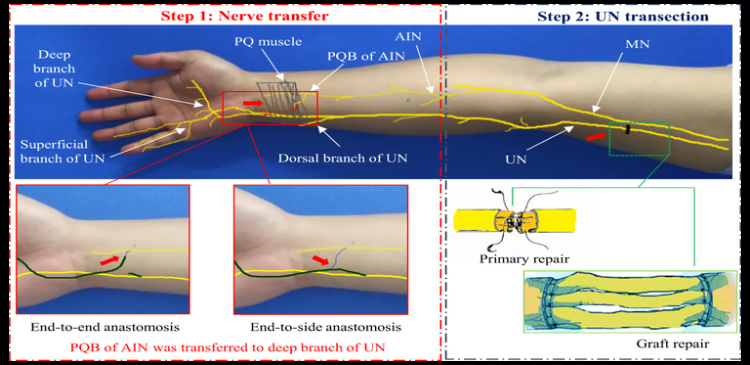Peripheral
nerve injuries
Diagnosis
Your doctor will
review your medical history, ask about any accidents or previous surgeries, and
discuss your symptoms with you. Your doctor will also conduct a physical and
neurological examination. If your neurological examination shows signs of a
nerve injury, your doctor may recommend diagnostic tests, which may include:
·
Electromyography (EMG). In an EMG, a thin-needle electrode inserted into your
muscle records your muscle's electrical activity at rest and in motion. Reduced
muscle activity can indicate nerve injury.
·
Nerve conduction study. Electrodes placed at two different points in your body
measure how well electrical signals pass through the nerves.
·
Magnetic resonance imaging (MRI). MRI uses a magnetic field and radio
waves to produce detailed images of the area affected by nerve damage.
Treatment
If a nerve is injured
but not cut, your injury is more likely to heal. Injuries in which the nerve
has been completely severed are very difficult to treat and recovery may not be
possible.
Your doctor will
determine your treatment based on the extent and cause of your injury and how
well the nerve is healing.
·
If your nerve is healing properly, you may not need surgery. You
may need to rest the affected area until it's healed. Nerves recover slowly and
maximal recovery may take many months or several years.
·
You'll need regular checkups to make sure your recovery stays on
track.
·
If your injury is caused by a medical condition, your doctor
will treat the underlying condition.
·
Depending on the type and severity of your nerve injury, you may
need medications such as aspirin or ibuprofen (Advil, Motrin IB, others) to
relieve your pain. Medications used to treat depression, seizures or insomnia
may be used to relieve nerve pain. In some cases, you may need corticosteroid
injections for pain relief.
·
Your doctor may recommend physical therapy to prevent stiffness
and restore function.
Surgery
If your injury does
not seem to be healing properly, your surgeon can use EMG testing in
the operating room to assess whether scarred nerves are recovering. Doing
an EMG test directly on the nerve is more accurate and reliable than
doing the test over the skin.
Sometimes a nerve sits
inside a tight space (similar to a tunnel) or is squeezed by scarring. In these
cases, your surgeon may enlarge the tight space or free the nerve from the
scar.
Sometimes a section of
a nerve is cut completely or damaged beyond repair. Your surgeon can remove the
damaged section and reconnect healthy nerve ends (nerve repair) or implant a
piece of nerve from another part of your body (nerve graft). These procedures
can help your nerves to regrow.
If you have a
particularly severe nerve injury, your doctor may suggest surgery to restore
function to critical muscles by transferring tendons from one muscle to
another.
Restoring
function
A number of treatments
can help restore function to the affected muscles.
·
Braces or splints. These devices keep the affected limb, fingers, hand or
foot in the proper position to improve muscle function.
·
Electrical stimulator. Stimulators can activate muscle served by an injured nerve
while the nerve regrows. However, this treatment may not be effective for
everyone. Your doctor will discuss electrical stimulation with you if it's an
option.
·
Physical therapy. Therapy involves specific movements or exercises to keep
your affected muscles and joints active. Physical therapy can prevent stiffness
and help restore function and feeling.
·
Exercise. Exercise
can help improve your muscle strength, maintain your range of motion and reduce
muscle cramps.
Preparing for your appointment
A number of tests may
be used to help diagnose the type and severity of peripheral nerve injuries.
When you make your appointment, be sure to ask whether you need to prepare for
these tests. For instance, you may need to stop taking certain medications for
a few days or avoid using lotions the day of the test.
If possible, take
along a family member or friend. Sometimes it can be difficult to absorb all
the information you're given during an appointment. Someone who accompanies you
may remember something that you forgot or missed.
Other suggestions for
getting the most from your appointment include:
·
Write down all your symptoms, including how you were injured, how long you've had your
symptoms and whether they've gotten worse over time.
·
Make a list of all medications, vitamins and supplements that you're
taking.
·
Don't hesitate to ask questions. Children and adults with peripheral
nerve injuries have several options for restoring lost function. Be sure to ask
your doctor about all the possibilities available to you or your child. If you
run out of time, ask to speak with a nurse or have your doctor call you later.
·

